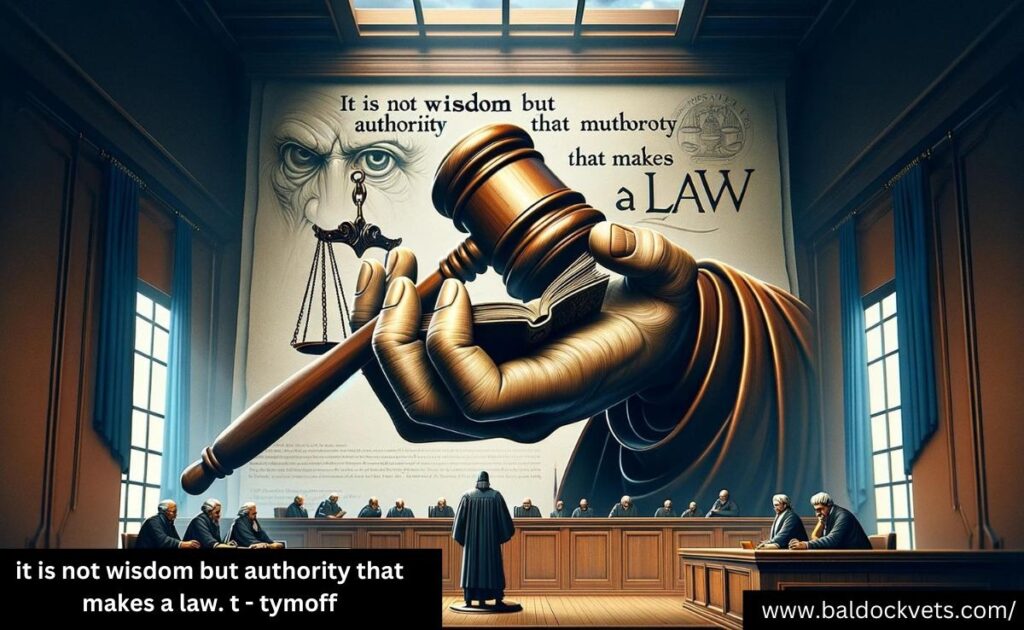Introduction It is Not Wisdom But Authority That Makes a Law – T. Tymoff
The phrase It is Not Wisdom But Authority That Makes a Law – T. Tymoff encapsulates a significant aspect of legal philosophy. This statement emphasizes the role of authority in the creation and enforcement of laws, rather than the inherent wisdom or morality of those laws. In this article, we will delve into the meaning and implications of this statement, explore historical and contemporary examples, and discuss the interplay between authority and wisdom in legal systems.
Understanding Authority in Law
Authority in the context of law refers to the power or right to give orders, make decisions, and enforce obedience. This power is often vested in institutions or individuals who hold positions of control within a society. Authority is fundamental to the functioning of any legal system because it provides the mechanism through which laws are implemented and maintained.
The Basis of Legal Authority
Legal authority is derived from various sources, including constitutions, statutes, regulations, and precedents. These sources establish the framework within which laws are created and enforced. The legitimacy of legal authority often stems from the consent of the governed, as well as the institutional structures that support the rule of law.
Historical Perspectives on Legal Authority
Throughout history, the concept of authority in law has evolved. Ancient legal systems, such as those in Mesopotamia and Rome, relied heavily on the authority of rulers and religious leaders. The Magna Carta of 1215 marked a significant shift by asserting that even the king was subject to the law, thereby limiting absolute authority and paving the way for more democratic legal systems.
The Role of Wisdom in Lawmaking
Wisdom, on the other hand, refers to the ability to think and act using knowledge, experience, understanding, common sense, and insight. In the context of law, wisdom involves making decisions that are just, fair, and beneficial to society. However, Tymoff’s statement suggests that wisdom alone is insufficient to create and enforce laws without the backing of authority.
The Ideal of Wise Lawmaking
The ideal scenario in lawmaking is one where laws are both wise and authoritative. Wise laws are those that reflect ethical principles, promote justice, and contribute to the common good. Lawmakers who possess wisdom are likely to create laws that are effective, fair, and enduring It is Not Wisdom But Authority That Makes a Law – T. Tymoff.
Challenges to Wise Lawmaking
Despite the aspiration for wise lawmaking, there are numerous challenges. Political pressures, lobbying, and personal biases can influence lawmakers, leading to laws that may lack wisdom. Additionally, the complexity of modern societies often makes it difficult to predict the long-term consequences of laws, even with the best intentions.

Case Studies: Authority vs. Wisdom in Law
Examining specific case studies can illuminate the tension between authority and wisdom in lawmaking. These examples demonstrate how laws can be shaped by authority, sometimes at the expense of wisdom.
The Prohibition Era in the United States
The Prohibition Era (1920-1933) in the United States is a notable example where authority trumped wisdom. The 18th Amendment, which banned the production, sale, and transportation of alcoholic beverages, was enacted by authority. However, it lacked the wisdom to foresee the negative consequences, such as the rise of organized crime and widespread non-compliance. The eventual repeal of Prohibition with the 21st Amendment highlighted the need for laws to be both authoritative and wise.
Apartheid in South Africa
Apartheid in South Africa is another stark example. The laws enforcing racial segregation and discrimination were established by the authoritative government of the time. These laws lacked moral and ethical wisdom, leading to severe social injustice and international condemnation. The dismantling of apartheid and the establishment of more equitable laws underscore the importance of wisdom in lawmaking.
Contemporary Issues: Authority and Wisdom in Modern Law
In the contemporary world, the balance between authority and wisdom continues to be a pressing issue. Various legal and political challenges illustrate the ongoing struggle to align authority with wisdom.
Data Privacy and Surveillance
The rapid advancement of technology has brought data privacy and surveillance to the forefront of legal debates. Authorities have implemented laws to enhance national security and public safety, such as the USA PATRIOT Act. However, these laws often raise concerns about privacy and civil liberties. Finding a wise balance between security and individual rights remains a complex challenge for lawmakers.
Climate Change Legislation
Climate change is another area where authority and wisdom must converge. Governments worldwide have enacted laws and regulations to mitigate the impact of climate change. These laws require authoritative enforcement to be effective. However, the wisdom of such laws is crucial to ensure they are scientifically sound, equitable, and sustainable.
The Interplay of Authority and Wisdom in Legal Systems
The interplay between authority and wisdom is essential for a functional and just legal system. While authority provides the means to enforce laws, wisdom ensures that these laws serve the best interests of society.
The Role of the Judiciary
The judiciary plays a critical role in balancing authority and wisdom. Judges interpret and apply laws, often using their wisdom to ensure just outcomes. Judicial review allows courts to assess the constitutionality and fairness of laws, providing a check on legislative and executive authority.
Democratic Processes and Public Participation
Democratic processes and public participation are also vital. Through elections, referendums, and public consultations, citizens can influence lawmaking, ensuring that laws reflect collective wisdom. Transparency and accountability in governance further enhance the alignment of authority with wisdom.
Conclusion
It is Not Wisdom But Authority That Makes a Law – T. Tymoff stated, highlights the fundamental role of authority in lawmaking. However, the pursuit of a just and effective legal system requires the integration of both authority and wisdom. Historical and contemporary examples demonstrate the consequences of neglecting either element. By striving for wise and authoritative laws, societies can create legal frameworks that uphold justice, protect rights, and promote the common good. The challenge for modern lawmakers is to navigate this complex interplay, ensuring that the laws they enact are both powerful and prudent.

